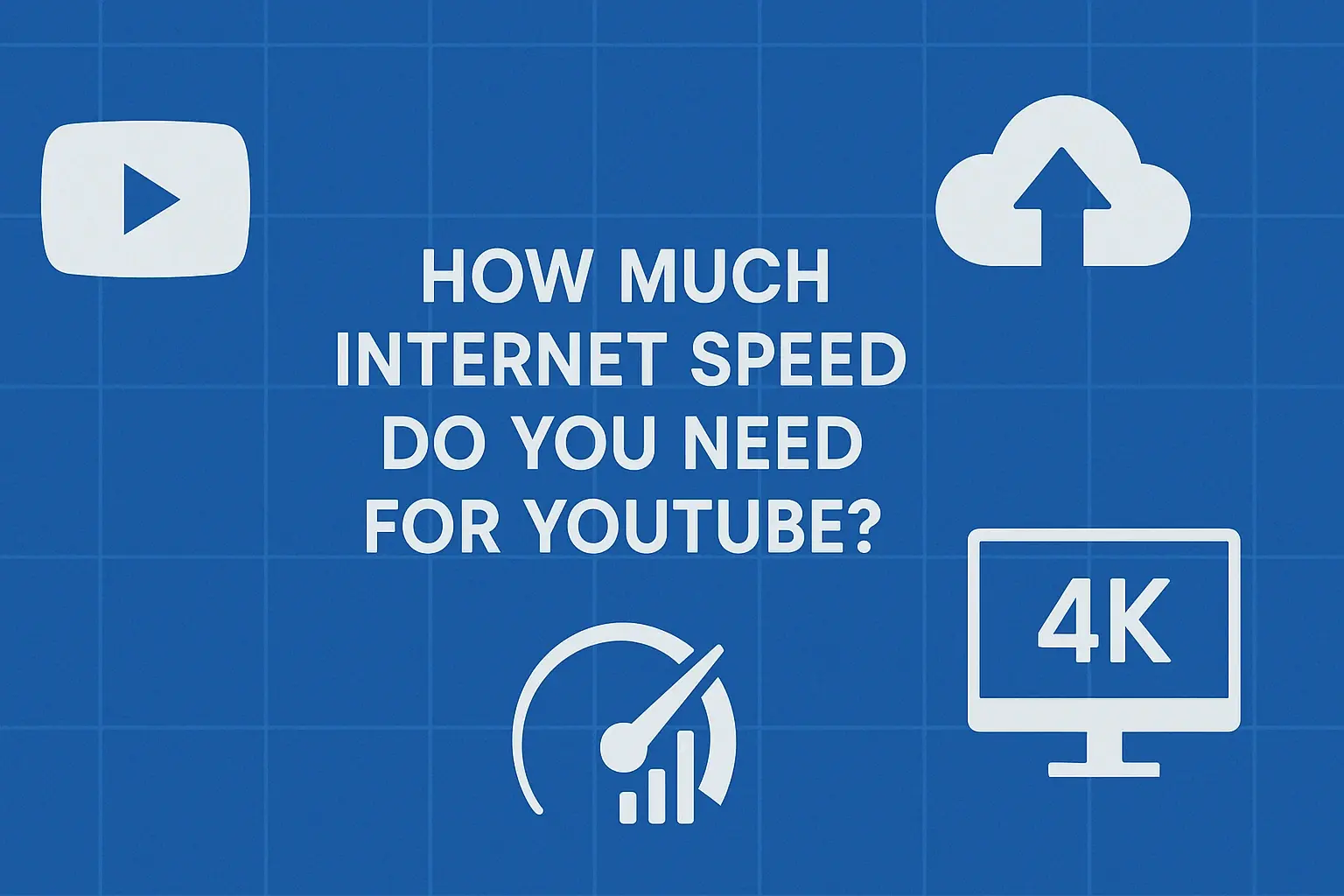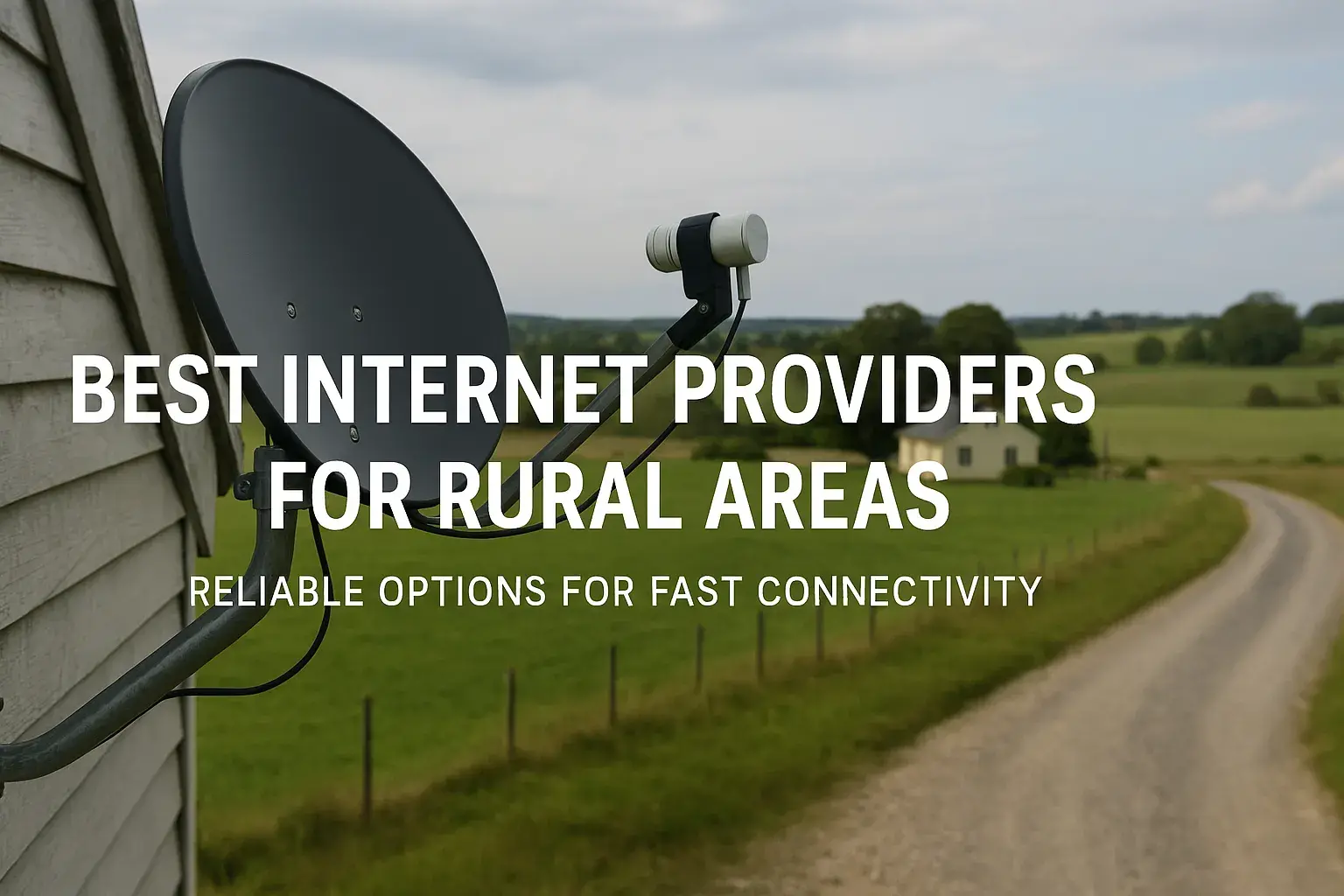
In today's world, a reliable internet connection is essential for all businesses. It's not just a nice thing to have, but a must for smooth operations. A reliable business internet connection helps you stay in touch with customers, work with your team, use cloud services, and handle online transactions. Picking the right internet service provider (ISP) is very important. It ensures your business has a fast, secure, and steady internet connection. This blog will help you understand what to look for when choosing an internet service to reach your business goals.
Evaluating Internet Service Providers for Businesses
It's common to feel stressed by all the options when picking an internet service provider (ISP) for your business. But if you know your specific needs and what matters most, you can simplify your choices. This way, you can find an ISP that fits your business goals.
Start by thinking about what type of business you have. Consider how many employees depend on the internet connection. Think about the apps and online services you need every day.
Next, look at your budget and your future internet needs. It's wise to choose an ISP with services that can grow as your business grows. This can help you keep a reliable internet connection without losing quality. Remember, putting money into a strong internet service is a good investment in your business’s success.
Importance of Reliable Internet for Business Success
In today's digital world, business success depends a lot on a reliable internet connection. A reliable business internet connection helps companies build and keep a strong online presence. It also improves customer experiences and makes operations smoother. To get a competitive edge, businesses need a fast and steady internet connection.
Businesses use the Internet for many things. This includes video conferencing, cloud computing, e-commerce, and online marketing. They connect with customers, partners, and employees all over the globe. If the internet connection is slow or goes in and out, it can hurt productivity, lead to missed chances, and cause customer frustration.
A reliable business internet connection also allows companies to use new technology and adjust to changes in the digital world. As more businesses turn to cloud-based services, having a fast and stable internet connection is key for working together, storing data, and gaining access. So, investing in a reliable business internet connection means investing in your company’s future and its success in the online market.
Criteria for Selecting the Best ISP for Your Business
Choosing the right business internet provider (ISP) is very important for businesses in today's online world. Business owners should look at different factors based on what they need. Think about your business needs, like how many workers you have, what type of work you do, and how much you use cloud services.
Then, check the types of internet connections in your area. You may have options like fibre optic, cable, DSL, and satellite. Look at the advantages and disadvantages of each option based on speed, reliability, and cost. Also, don’t forget to think about customer support, contact details, and any hidden fees.
Make sure to research and compare different ISPs near you. Look at what other customers say, their reputation, and what they offer. By considering these points, business owners can make a smart choice and find an internet service provider that fits their specific needs and helps them grow.
Top Internet Service Providers in the United States
The United States has a competitive internet service market. Many providers compete for business customers. Some of the biggest names are AT&T, Verizon, Comcast Business, and Spectrum Business. They have a variety of plans for different business sizes and needs. These providers offer options like fibreoptic, cable, and DSL internet services. They also provide extra services like online backup, data security, and voice solutions.
When you choose an ISP, it's important to think beyond just the brand name. Check their network coverage in your area. Look at customer reviews about their reliability and support. Don't forget to compare prices and contract terms. Making a smart choice helps ensure your ISP meets your business needs and can help it grow.
Overview of Leading ISPs
The world of business internet service providers keeps changing. Many big companies are competing for customers. Some of the top names are Verizon, AT&T, and Spectrum Business, which are well-known for their fast download speeds. They all have different plans to meet the needs of businesses. These providers offer different kinds of internet connections. This includes fibre optic, cable, and DSL. Each has its speed and reliability.
Verizon is known for its broad fibre optic network. It offers some of the highest internet speeds out there, which include the highest speeds available. This makes it a great choice for businesses that need a lot of bandwidth. AT&T has a mix of fibre, DSL, and fixed wireless options. This gives businesses flexibility based on where they are located. On the other hand, Spectrum Business has worked hard to grow its fibre options, providing good speeds and pricing for businesses both big and small.
When choosing a provider, businesses should think about what they need. This includes looking at upload and download speed needs, how reliable the network is, and their budget. Checking customer reviews and comparing service agreements can help businesses make smart choices.
Unique Features & Offerings of Each ISP
Each internet service provider has different features and packages to attract businesses. Some key things that set them apart are better internet availability, data limits, and extra services like online backup and security.
AT&T focuses a lot on its fibre internet network. It offers fast speeds and good reliability at the lowest price. Verizon, another big provider, has different plans that come with a mix of download and upload speeds. They also offer unlimited data plans, which are great for businesses with high data needs. Comcast Business is known for its wide cable network and good prices. Smaller satellite providers help businesses in remote areas where wired internet is not available.
When you compare ISPs, keep in mind these things:
-
Fiber internet availability in your area.
-
Data limits and extra charges.
-
Options to bundle internet, phone, and TV services.
-
Availability of added services like static IP addresses and online backup.
-
Customer support and how flexible they are with contracts.
Understanding Different Types of Business Internet Connections
Choosing the right internet connection is very important for businesses. It helps them run smoothly and perform well. There are different types of connections, each with its pros and cons. It is vital to know these differences to make a good choice.
Fibre optic internet is fast and reliable. It is great for businesses that need high speeds for heavy programs. Cable internet is another option. It is affordable and widely available, but its speeds can change based on how many users are online. DSL uses old telephone lines and is more traditional. On the other hand, satellite internet works for businesses in far-off rural areas. You should look at your needs carefully. Think about the pros and cons of each type of connection to find the best choice for your business.
Fiber vs. Broadband: What's Best for Your Business?
When choosing the best internet connection for your business, it is important to compare fibre internet and broadband. Fibre internet is now seen as the best option for companies that need a lot of bandwidth and fast upload speeds. It uses light to send data, which gives very fast speeds and strong reliability. This makes it perfect for businesses that transfer large files, have frequent video conferencing, or depend on cloud-based apps.
Broadband includes different types of technology, like cable and DSL. It usually costs less than fibre. However, while broadband may work for smaller businesses with average internet needs, it uses shared network systems. This can cause slower speeds during busy times, affecting productivity and possibly slowing down essential business tasks.
In the end, the right choice will depend on what your business needs. Look at factors like your budget, the speeds you need, and how much you depend on real-time applications. These will help you find the right internet connection that fits your business.
The Role of 5G in Business Internet Services
5G is quickly changing how businesses use Internet services, including options like Internet Air. It offers fast speeds and good connectivity. As a new type of cellular network, 5G gives options other than traditional wired connections. This is great for businesses that want fast and flexible wireless internet solutions, such as Internet Air.
With low latency and high bandwidth, 5G allows businesses to enjoy smooth video conferencing, cloud computing, and easy large file transfers. This better connectivity helps businesses work well and grow in the online world.
But, you should know that 5G may not be available everywhere and its performance can change based on where you are. Businesses looking at 5G for their internet should check with suppliers to see if they have coverage in their area and if it fits their needs.
Speed, Reliability, and Scalability
For businesses to do well online, it's important to pick an internet plan that has great speed, strong reliability, and can change as your needs grow. Looking at these three things can help you avoid slowdowns and keep your work smooth.
Instead of just going for the fastest option, think about what you need. This includes how many users will be online, the type of work you do, and the important apps you use each day. By thinking about how your business might grow, you can choose a plan that fits your future goals. This way, your internet connection will keep up with what you want to achieve.
How to Assess Your Business's Internet Speed Requirements?
Before you choose an internet service provider, it is important to check the internet speeds your business needs. This helps keep your online work running smoothly. You should think about how many employees you have, what they do online, and what important apps they use regularly.
You need to look at both download speed and upload speed. Download speed is how fast you get data from the internet. Upload speed is how quickly you can send data.
If many users often stream high-definition videos, download or upload large files, or join video conferencing, you will need a plan with higher bandwidth. Running a speed test on your current internet connection can give you a good starting point. Many online tools can help you figure out the bandwidth needed for regular business activities.
Keep in mind that low internet speeds can reduce productivity, cause delays, and lower service quality. This can harm your business’s profits. By investing in enough bandwidth, you ensure your internet connection meets your business demands now and in the future.
Evaluating the Reliability of ISPs: Uptime Guarantees and SLAs
Ensuring a good internet service is very important for businesses today. When you look for internet service providers (ISPs), pay attention to their uptime guarantees and service level agreements (SLAs). A strong uptime guarantee shows that the ISP is sure about its network's stability and wants to keep downtime low.
Choose ISPs that offer uptime guarantees of 99.9% or more. This means you will have less than nine hours of downtime each year. Also, check the SLAs to learn about things like latency, packet loss, and support response times.
A well-done SLA should explain what happens if there are service issues, so your business stays protected. By choosing ISPs with strong uptime guarantees and detailed SLAs, businesses can lower the risks of internet downtime and keep their work running smoothly.
Scalability Options for Growing Businesses
Scalability is an important point for growing businesses when they look at internet plans. As your business gets bigger, you will need more bandwidth. It's important to pick a plan that can handle more data, support more users, and work with new technologies. Many internet service providers (ISPs) offer plans made just for small business internet needs. This way, you can easily upgrade your plan as your business expands.
Before you choose a plan, ask about the ISP's options for upgrading. Check for any costs or time it might take during the switch. It's essential to choose an ISP that provides flexible plans so you can increase bandwidth or add features smoothly. This helps your business grow without major interruptions.
A scalable small business internet solution makes sure your online work can keep up with your goals. This way, you avoid slowdowns and keep a smooth online experience as your business reaches new heights.
Costs and Contracts: Navigating the Fine Print
Navigating the details of costs and contracts for business internet plans needs careful attention. When you compare different ISPs, don't just look at the advertised price. It's essential to read the fine print too, especially to determine if you are in good standing with any requirements. Check for installation fees, equipment rental costs, and any data overage charges that could raise your monthly bill a lot.
Pay special attention to the contract terms. This includes the minimum length of the contract, early termination fees, and any promotional rates that might end after a while. Knowing these details helps you make smart choices that fit your budget and keep surprises from happening.
Understanding Pricing Models for Business Internet
Understanding the different pricing models for business internet services is important for making smart spending choices. Internet service providers, or ISPs, have various pricing plans, each with its advantages and disadvantages. Some ISPs may attract customers with low starting rates, but it is important to think about long-term costs.
Look at important things like data caps, extra charges if you go over, and any possible price hikes after the deal period ends. Ask about the costs for installation, renting equipment, and any taxes or extra fees that can change the total price.
Also, read the contract carefully. Pay special attention to how long the contract lasts and any early termination fees. Knowing these pricing details helps businesses choose a plan that fits their budget and avoids surprise costs.
Tips for Negotiating Contracts with ISPs
Negotiating contracts with internet service providers (ISPs) may seem hard, but you can get a good deal if you prepare well. Start by looking into what other providers are offering in your area. This gives you some power during the negotiations. Don't be afraid to ask for discounts or to remove installation and activation fees. You can also ask for a longer time at the special promotional price.
Be clear about your budget and what you need. Talk about how your business can be a strong customer in the long run. If you are changing from a different provider, ask about buyout options to help with any early termination fees.
Make sure to check the contract details before you sign. Look at monthly costs, data limits, and installation appointment times. This can help you avoid any surprises later. By being well-informed, confident, and active in your talks, you can get a business internet plan that fits your needs and is fairly priced.
Value-Added Services and Support
When looking for internet service, it's important to think about more than just speed and reliability. Check the extra services and support offered by different providers. Look for things like domain name registration, web hosting, email services, and online backup. These can help you improve your online presence and make your work easier.
Good customer support is key. It helps fix problems quickly and keeps your service running smoothly. Ask about how the ISP offers support, like through phone, email, or live chat, and when it’s available. Picking an ISP with fast customer service and great extra features can save you time, money, and stress later on.
Security Features and Their Importance
In today's online world, focusing on security features is very important for businesses. It helps keep their data safe and ensures reliable connectivity. When you look for internet service providers (ISPs), ask about the security steps they take to protect your business from online threats.
Check for features like firewalls, anti-malware tools, and systems that spot intrusions. These help stop unauthorized access and data leaks. Also, see if the ISP has virtual private network (VPN) services. This is especially important if workers need to access sensitive information from home.
You should also ask about static IP addresses. These give your business a steady online identity. This is key for hosting servers, making online sales, and improving certain app functions. By prioritizing security features, you create a safe and trustworthy online space for your business.
Customer Support: What to Expect and Demand
Exceptional customer support is very important when picking an internet service provider (ISP) for your business plan. Good and quick customer service can help a lot, especially during unexpected outages or tech issues that might slow down your work.
Before you choose an ISP, ask about the support options they offer, like phone, email, or live chat. Check their support hours and how fast they respond by looking at customer reviews and online discussions. A trustworthy ISP will have a support team ready to help business customers with their specific needs.
Keep in mind that a reliable internet connection is crucial for keeping your business running smoothly. Picking an ISP that focuses on customer happiness and provides strong customer support will help you feel secure, knowing you can get help whenever you need it.
Making the Switch: Transitioning to a New ISP
Transitioning to a new internet service provider (ISP) needs careful planning. This helps reduce downtime and keeps your business running smoothly. Check your current contract first. Look for any early termination fees. Also, back up all important data to keep it safe during the switch.
Work closely with your new ISP to set an installation appointment. Try to pick a time that won’t disrupt your business hours. Talk about your needs, like static IP addresses or special equipment setups. Good communication and planning ahead are important for an easy switch to your new ISP.
Planning for Minimal Disruption
Transitioning to a new internet service provider (ISP) doesn't have to cause a lot of downtime for your business. With good planning and coordination, you can keep disruptions to a minimum. Start by backing up all important data to an external hard drive or cloud storage. This prevents data loss during the switch.
Next, plan the installation appointment for a time when your business is not busy, like after hours or on a weekend. This way, you reduce the effect on your daily work. If your phone line depends on your internet connection (VoIP), let your ISP know ahead of time. They can offer backup communication options during the change.
Think about having backup internet options ready, like mobile hotspots or a different internet connection. This helps you stay connected during any unexpected delays. By taking these steps, you can make your switch to a new ISP easy and keep your business running smoothly.
Coordination with Your New ISP for a Smooth Transition
Coordinating well with your new internet service provider (ISP) is important. This helps you have a smooth transition and less disruption to your new business internet service. Before the installation date, check the appointment time. Make sure someone is there to give access and answer questions for the technicians.
Share your specific business needs with your new ISP. This includes if you need static IP addresses, special equipment setup, or specific configurations. Good communication helps avoid delays and makes sure your new internet service is set up right from the start.
After the installation, test the connection thoroughly. If there are any issues, report them to your ISP right away. Most ISPs give a grace period to fix any setup problems or service issues. Being proactive and coordinating closely with your new ISP is key for a successful and smooth transition to your new business internet service.
Conclusion
In conclusion, picking the right internet service provider is important for smooth business operations and growth. Think about reliability, scalability, and cost when you make your choice. Look at what each ISP offers to meet your business needs. A smooth switch to a new ISP can help reduce problems. For more help in finding the best internet service for your business, check out our FAQs or contact our experts for personal advice. Choosing wisely today can lead to a more efficient and productive tomorrow.






